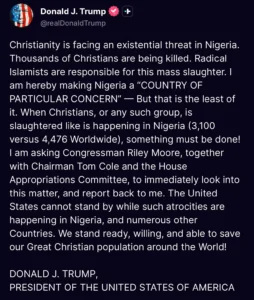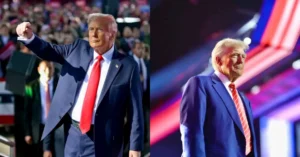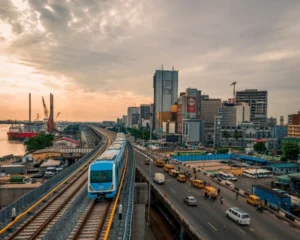Trump Orders US Probe into Christian Massacre in Nigeria, Labels It an “Existential Threat”
In a forceful statement on Truth Social dated October 31, 2025, former U.S. President Donald Trump announced that the United States will launch an investigation into what he described as a massive Christian massacre in Nigeria. He declared that Christianity in Nigeria is confronting an “existential threat” and directed U.S. lawmakers to take immediate action.
Trump’s post asserted that “thousands of Christians are being killed” and accused radical Islamist groups of orchestrating a wave of religiously motivated killings. He further ordered Congressman Riley Moore and Chairman Tom Cole, along with the House Appropriations Committee, to look into the matter and report their findings directly to him. Eyes Of Lagos reports,
“Christianity is facing an existential threat in Nigeria. Thousands of Christians are being killed,” he wrote.
“Radical Islamists are responsible for this mass slaughter.”
He added: “I am hereby making Nigeria a ‘COUNTRY OF PARTICULAR CONCERN.’ … The United States cannot stand by while such atrocities are happening … We stand ready, willing, and able to save our Great Christian population around the world.”
By designating Nigeria as a Country of Particular Concern (CPC) under U.S. rules regarding religious freedom, Trump signaled his intent to place Nigeria on a watch list for potential diplomatic or sanctions-related pressure.
Why It Matters & Reactions
Nigeria is no stranger to religious and ethno-sectarian violence, particularly in regions where herders, farmers, and militant groups clash. However, Trump’s framing as a targeted massacre of Christians elevates the matter to an international diplomatic level. His statement has already reverberated across media outlets.
The Associated Press notes that by placing Nigeria on its CPC list, the U.S. signals possible sanctions or restrictions, especially on non-humanitarian aid.
Meanwhile, some voices within U.S. administration circles caution against interpreting the violence as one-sided. A Trump adviser recently contended that terrorism bears no religion and reminded critics that groups like Boko Haram and ISIS have also targeted Muslim communities.
What Trump Is Demanding
-
A full investigation by Congressman Riley Moore, Rep. Tom Cole, and the House Appropriations Committee into the alleged Christian massacre
-
Formal designation of Nigeria as a Country of Particular Concern
-
A public report of findings and recommendations on U.S. policy response
-
A promise that the U.S. “stands ready” to protect Christians globally
If fully implemented, this move could stretch beyond rhetoric into diplomatic consequences, including restrictions on U.S. aid and increased international scrutiny of Nigeria’s human rights record.
Challenges & Counterarguments
While Trump’s pronouncement carries symbolic and political weight, it faces several hurdles:
-
Credibility & Evidence
The numbers cited—“thousands killed”—are hard to verify immediately. Independent investigations would be required to substantiate claims of mass religious targeting. -
Complex Security Landscape
Nigeria’s security crisis is multi-dimensional: gangs, bandits, herder-farmer conflicts, and militant insurgencies all contribute to violence. Some analysts argue the situation cannot be reduced to religion alone. -
Backlash & Domestic Sensitivities
Certain Muslim and Northern Nigerian communities view Trump’s framing as biased or inflammatory, potentially aggravating divisions. -
U.S. Leverage Limits
Nigeria is a sovereign state and may resist foreign pressure. Any punitive or conditional measures could generate counteraction or diplomatic distancing.
What This Means for Nigeria
-
Increased International Scrutiny: Nigeria’s handling of religious and security issues will likely be under more global spotlight.
-
Potential U.S. Aid Review: Non-humanitarian U.S. assistance could be reconsidered or tied to new compliance benchmarks.
-
Domestic Pressure: The Nigerian government may face internal demands for accountability, particularly from Christian groups and human rights advocates.
-
Polarization Risk: Trump’s framing may deepen fault lines among religious communities, especially if viewed as favoring one side.
Conclusion
Donald Trump’s call to investigate the alleged Christian massacre in Nigeria marks a serious escalation in how foreign powers may engage with Nigeria’s internal security and religious affairs. By invoking the “existential threat” language and formally designating Nigeria a Country of Particular Concern, the former president is pushing the issue into the realm of U.S. foreign policy action.
The coming weeks will test how Nigerian authorities respond—whether through transparent investigation, diplomatic engagement, or stronger domestic security methods. For Nigerians, the stakes are high: the narrative now includes not only lives lost but also questions of identity, international solidarity, and political will.










